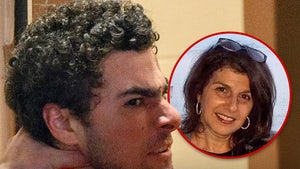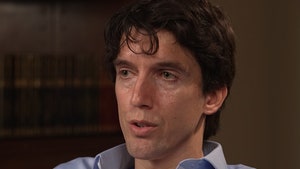Last Friday, the group sent e-mails to 120,000 members, encouraging them to hold house parties on Oscar night -- just as it did the night DeGeneres came out. It's also sending out "Oscar party kits" to help in recruiting, and is offering prizes of T-shirts, bags and watches, depending on how many new members get signed up.
When Ang Lee's soulful film about twocowboys in love premiered in December, the gay community wasdelighted -- but, in some corners, skeptical that it would playbeyond New York and California.
Now, though, the film is a clear hit. Ithas performed strongly across America, appealing to audiences bothgay and straight, male and female. Because of its subject matter,it's one of the most talked-about films in recent memory -- and aconstant reference for late-night comics and Internet spoofs.
"I wish I knew how to quit you," spokenby the character Jack Twist, is becoming a virtual catch phrase.And the word "brokeback" (used as an adjective, to describesomething with gay overtones -- sort of), is creeping into thelexicon, too.
It isn't only "Brokeback Mountain"that's making gay rights groups anticipate Oscar night. Two otherhighly feted movies have gay or transsexual themes: "Transamerica,"with best-actress nominee Felicity Huffman as a man preparing for asex change, and "Capote," with best-actor favorite Philip SeymourHoffman as the gay author of "In Cold Blood."
"This has been a landmark year," saysNeil G. Giuliano, president of GLAAD, the Gay and Lesbian AllianceAgainst Defamation. "By telling our stories, this year's Oscarnominees have helped raise the visibility of our issues and havegiven millions of Americans a greater understanding of who weare."
Matt Foreman, executive director of theNational Gay and Lesbian Task Force, agrees, but sounds acautionary note. Just because "Brokeback" is being embraced byHollywood and popular culture, he says, doesn't mean the real worldis catching up.
"'Brokeback Mountain' is incrediblyimportant for our day-day work because it clearly touches people ata visceral level," Foreman said. "But the tragedy is, thatbreakthrough is not being replicated at the legislative andpolitical level" -- on issues such as gay marriage and hate crimeslegislation.
"So people see this gay acceptance atthe Oscars, and think, 'Oh, everything's good for gays in America.'It's this huge chasm between popular culture and the reality of ourlives."
For Gilbert, though, the emotionalimpact of "Brokeback" is so great that he cannot imagine it won'thave a long-lasting effect.
The grandson of a rodeo rider, Gilbert,who works in hospital administration and still competes with hisquarterhorse in rodeos, grew up in Michigan. As a teenager he hadan early gay relationship -- the two young men competed at horsefairs together -- but moved away to escape the turmoil andconfusion it evoked in him.
His first marriage failed after severalyears, and he found himself turning to drinking and drugs. A secondmarriage failed as well. Then came the love of his life -- anotherman. "We both left our wives for each other," he says. Thattroubled eight-year relationship ended with his partner's death in1997.
A few weeks ago, before "Brokeback" cameto his hometown of Battle Creek, Mich., Gilbert drove more than 80miles to Ann Arbor to see the film. He missed the first show by 15minutes, waited in his truck for the next one, and drove back atmidnight, emotionally drained.
"I really felt like I had lived throughthe experiences they were showing onscreen," he said. Thesimilarities to his own life were striking: his early efforts todeny his gay orientation, his failed marriages to women, thedesolation he felt when his male lover died.
Gilbert hopes that any Oscars"Brokeback" wins will bring home to straight Americans -- forinstance, his fellow church members -- that gay people "can sharethe same love that a heterosexual couple can."
"I know that many people in my churchwill never see this movie," he says. "But they can't help but beaffected by all the people who have seen it, and loved it."
Some of those who do love the movie willbe gathering at Woody's, a gay bar in Philadelphia, on Oscar nightfor one of the fundraising parties for the Human RightsCampaign.
The party's organizer, Norman Baker,says he realized just how deep an impact "Brokeback" was havingwhen his 84-year-old mother, who has failing eyesight and doesn'tgo to movies often, asked him to take her, noting: "Everyone istalking about this film." He had come out to his mother in 1988,but the two hadn't spoken about his gay life since.
This year's Oscar party, the secondannual such gathering, will have a theme, Baker said. Participantswill be asked to dress as their favorite movie characters.
"Yes," he said, "we do expect a fairnumber of gay cowboys."




